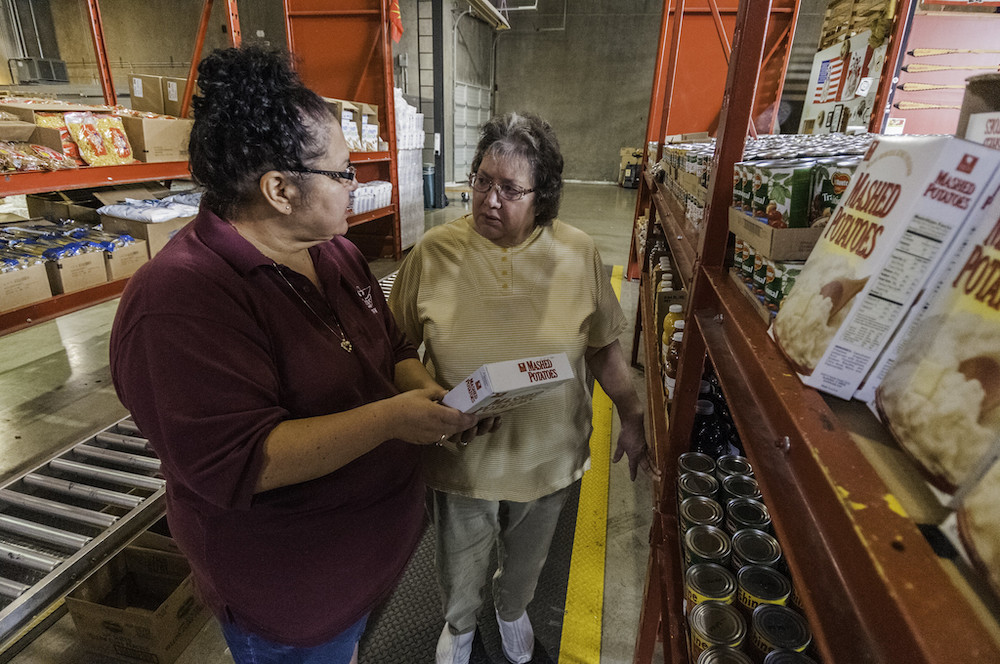
- Details
- By Brian Edwards
On Monday, congressional leaders from the powerful Senate and House appropriations committees ramped up pressure on the U.S. Department of Agriculture (USDA), seeking answers and swift action to address food shortages impacting Native American communities.
In a detailed letter to Agriculture Secretary Tom Vilsack, the bipartisan, bicameral group of lawmakers demanded an explanation for the USDA’s handling of the Food Distribution Program on Indian Reservations (FDPIR), which they say has resulted in months of delayed, inconsistent, and incomplete food deliveries to tribal communities across the country.
[Editor's Note: This article was originally published by Tribal Business News, Native News Online's sister publication. Used with permission. All rights reserved.]
The letter today follows an earlier one sent Aug. 23 by a bipartisan group of seven senators who expressed their alarm over disruptions to FDPIR deliveries since April, when the USDA consolidated its tribal warehouse operations to a single contractor, Kansas City, Mo.-based Paris Brothers Inc.
“Tribes are deeply worried about when food will arrive and when USDA will resolve this situation,” Senate and House lawmakers wrote in Monday’s letter. “It is the federal government’s responsibility to uphold its trust and treaty obligations to Tribes, and this situation must be resolved immediately.”
Today’s letter requests information and documentation regarding the transition to one contractor, timelines of events, communication with stakeholders, impact on Tribes, accountability of the contractor, and actions being taken to resolve the situation. The congressional members urged immediate action to rectify the food shortage crisis and emphasize the importance of upholding trust and treaty obligations to tribal communities.
They also inquired about potential impacts on other food distribution programs, such as the Commodity Supplemental Food Program (CSFP), which serves low-income seniors.
The lawmakers have set a deadline of September 9 for the USDA to provide a comprehensive response to their questions, along with any relevant documentation. The letter was signed by a group of high-ranking members from both chambers, including House Appropriations Chairman Tom Cole (R-OK) and Ranking Member Rosa Delauro (D-CT), as well as Senate Appropriations Chair Patty Murray (D-WA), and Senate Appropriations Vice Chair Susan Collins (R-ME).
In a statement, Cole, an enrolled member of the Chickasaw Nation of Oklahoma and the first Native American to serve as chairman of the House Appropriations Committee, said the disruptions to vital safety net programs were unacceptable and failed to uphold our trust and treaty obligations. “Tribes’ voices have been heard and will continue to be at the forefront as Congress further investigates this crisis,” Cole said.
The FDPIR serves more than 50,000 Native American households each month, providing essential food assistance to income-eligible families.
Mary Greene Trottier, president of the National Association for FDPIR, told Tribal Business NewsTribal Business News on July 13 that the situation had been dire for months. “We’re hearing from almost every tribe participating in the program that they’ve been impacted in some way,” Trottier said. “People are going without.”
More Stories Like This
Native News Weekly (August 25, 2024): D.C. BriefsUS Presidents in Their Own Words Concerning American Indians
Next on Native Bidaské: Julian Brave NoiseCat on the Lumbee Nation’s 140-Year Fight for Federal Recognition
Hackers Compromise Native News Online Facebook Page
‘His stories can no longer be told.’ | Woman Pleads Guilty to 2016 Murder of Indigenous Master Woodcarver
Help us defend tribal sovereignty.
At Native News Online, our mission is rooted in telling the stories that strengthen sovereignty and uplift Indigenous voices — not just at year’s end, but every single day.
Because of your generosity last year, we were able to keep our reporters on the ground in tribal communities, at national gatherings and in the halls of Congress — covering the issues that matter most to Indian Country: sovereignty, culture, education, health and economic opportunity.
That support sustained us through a tough year in 2025. Now, as we look to the year ahead, we need your help right now to ensure warrior journalism remains strong — reporting that defends tribal sovereignty, amplifies Native truth, and holds power accountable.
 The stakes couldn't be higher. Your support keeps Native voices heard, Native stories told and Native sovereignty defended.
The stakes couldn't be higher. Your support keeps Native voices heard, Native stories told and Native sovereignty defended.
Stand with Warrior Journalism today.
Levi Rickert (Potawatomi), Editor & Publisher


